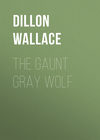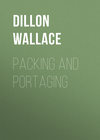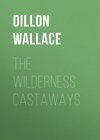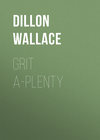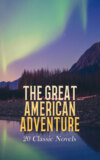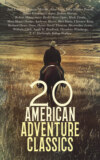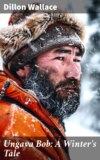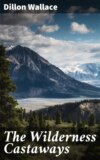Loe raamatut: «The Gaunt Gray Wolf», lehekülg 4
VII
WHERE THE EVIL SPIRITS DWELL
From the river tilt, as they called it, where their camp was pitched, the Big Hill trail led to the northwest for fifteen miles, then fifteen miles to the westward, where it took a sharp turn to the northward, in which direction it continued for nearly thirty miles, then again swung to the westward for fifteen miles, where it terminated on the shores of a small lake. This was the trail previously hunted by Bob.
Douglas Campbell had visited the Big Hill trail the preceding winter, but had not remained to hunt, and it had therefore been unoccupied during the winter. For the season at hand it had been transferred to Dick Blake, while Dick's own trail, farther down the river, was to remain untenanted, and the animals given an opportunity to increase. Directly below the Big Hill trail and adjoining it was Bill Campbell's trail.
Bob had been informed by Mountaineer Indians who camped during a portion of each summer near the Eskimo Bay post, that by following a stream flowing into the river a short distance above the river tilt of the Big Hill trail, and taking a west-northwesterly direction, he would find a series of lakes running almost parallel with the river, and lying between the river and the Big Hill trail.
Tradition said that this stream and series of lakes had at one time been an Indian portage route around the Great Falls of the Grand River, but for many years it had been generally avoided by Indians because of its proximity to the falls, which were supposed to be the abode of evil spirits, a superstition doubtless arising from the fact that Indian canoes may have been caught in the current above the falls and carried to destruction below; and because of the impression and awful aspect of the falls themselves, whose thunderous roar may be heard for many miles, echoing through the solitudes.
From the fact that this region had but rarely been traversed, and had certainly not been hunted by Indians for many generations, and that the animals within the considerable territory which it embraced had therefore been permitted to increase undisturbed by man, Bob argued that it must of necessity prove a rich trapping ground for the first who ventured to invade it. It was here, then, that he purposed establishing his first trapping trail.
The first step to be taken was to make a survey of the region, and with a quantity of steel traps, a limited supply of provisions, and Shad's light tent, the two young adventurers set forward in the canoe upon their scouting journey within the hour after Sishetakushin and Mookoomahn had left them.
A long portage and the ascent of a stream for several miles carried them that evening to the first of the series of lakes, where Bob's trained eye soon discovered unquestionable signs of an abundance of fur-bearing animals, sustaining his hope that the ground would be found virgin and profitable territory.
Their camp was pitched by the lake shore. At their back lay the dark forest, before them spread the shimmering lake, and to the westward a high hill lifted its barren peak of weather-beaten, storm-scoured rocks.
The atmosphere became cool as evening approached, and when supper was disposed of the fire was renewed, and, weary with their day's work, they reclined before its genial blaze to watch the sun go down in an effulgence of glory and colour.
Neither spoke until the colours were well-nigh faded, and the first stars twinkled faintly above.
"The most glorious sunset I ever beheld," remarked Shad finally, breaking the silence.
"'Twere fine!" admitted Bob. "We sees un often in here, this time o' year. They makes me think o' what the Bible says th' holy place in th' temple was t' be like–'A veil o' blue an' purple an' scarlet.' I'm wonderin', now, if th' Lard weren't makin' these sunsets just t' show what th' holy place be like, an' t' keep us from forgettin' un. I'm wonderin' if 'tisn't a bit o' th' holy place in th' temple o' Heaven, th' Lard's showin' us in them sunsets."
"I don't know," said Shad; "I don't remember it. I must confess I never read my Bible very much."
"I'll read un to you from my Bible when day comes," promised Bob.
Presently the aurora borealis flashed up upon the sky with the effect of a thousand powerful searchlights, the long fingers of light rising from the northern horizon to the zenith and flashing from east to west in a maze of every-changing colour–now white–now red–now yellow. It was a scene not only beautiful, but weird and awe-inspiring.
"I'm thinkin', now, o' th' northern lights," remarked Bob, when they had watched them for some time, "that they's flashes o' light from heaven. I'm thinkin' th' Lard sends un t' give us promise o' th' glories we'll have when we dies."
"That is a cheerful thought, at least," admitted Shad.
"Yes, 'tis cheerin'. Leastways, they always cheers me when I see un," declared Bob.
"Whenever I see them after this," said Shad, "I shall remember your suggestion–that they are the reflected glory of heaven, sent to inspire the dwellers upon earth."
As they arose to retire to their tent the dead silence of the wilderness was startled by the uncanny cry of a loon. Bob stood for a moment and listened. Then, turning to the tent, he remarked:
"'Tis a bad sign, when a loon laughs at night like that!"
"In what way?" asked Shad.
"'Tis said t' be a warnin' o' danger an' trouble."
In a series of portages from lake to lake they passed the next day through six lakes of varying size, caching traps now and again at convenient points for future use.
All the afternoon a low, rumbling sound was to be heard. Time and again they halted to listen. It was a changeless, sullen, muffled roar. Finally, when they reached the sixth lake, later in the afternoon, their curiosity got the better of them and they climbed a barren eminence to investigate. As they neared the summit the roar increased in volume, and when they reached the top and looked to the southward they beheld a cloud of vapour.
"'Tis th' Great Falls o' th' Injuns!" exclaimed Bob.
"Where the evil spirits dwell?" asked Shad.
"Aye, where th' evil spirits dwell." Around them lay a rugged scene of sub-Arctic grandeur. To the eastward the country was dotted with a network of small lakes similar to those through which they had been travelling, while to the northward a much larger lake appeared. The shores of these lakes supported a forest of black spruce, but every rise of ground was destitute of other growth than the gray caribou lichen which everywhere carpets the Labrador forest.
"There's a grand chance t' lay th' trails," said Bob. "We'll be makin' our trails along th' s'uth'ard lakes an' up t' that big lake, an' Ed's among th' lakes t' th' n'uth'ard."
"I'd like to see those falls," suggested Shad. "Can't we take the morning off to visit them?"
"An' you wants," agreed Bob. "We'll be buildin' a tilt down where th' canoe is, an' another on th' first lake, an' I'm thinkin' another on th' big lake above."
Accordingly the following morning, leaving their camp pitched and their canoe on the lake shore, they turned southward upon an exploring expedition. Their tramp carried them across a series of ridges and bogs and finally into a forest. With every step the roar increased, and at length they could plainly feel the earth tremble beneath their feet.
Suddenly they emerged from the forest to behold a scene of wild and sublime grandeur. They stood at the very brink of a mighty chasm. From far above them the river rushed down, a stupendous torrent of foam-crested billows and swirling whirlpools, impatient to make its leap into the depths at their feet where it was presently to be swallowed up in a bank of mist, which shimmered beneath the two adventurers like a giant opal lighted by all the colours of the rainbow. Below the rainbow-coloured mist the river again appeared, rushing in fearful power past beetling, frowning cliffs, which directly hid it from view. The very rocks upon which they stood trembled, and a reverberating roar rose from the canyon at their feet, so loud that conversation was well-nigh impossible.
[Footnote: These are the Grand Falls of Labrador. The river falls three hundred and sixteen feet with a single leap.]
For half an hour they stood enthralled by the scene, then they turned up the river, walking along its bank.
"'Tis an awful place down there," remarked Bob. "I'm not wonderin', now, th' Injuns thinks 'tis possessed by evil spirits."
"It is the most sublime scene I ever beheld," declared Shad. "One glimpse of it is worth all the trouble we've had in getting here."
The river gradually widened, but always with a strong current, even above the heavy white rapids, until some five miles above the falls it expanded into a large island-dotted lake. At the extreme lower end of this lake the old Indian portage trail was discovered, and following it the explorers late in the day reached their camp.
The following weeks were devoted to the erection of tilts–small log cabins to be used in winter as shelter. One was established well up the shores of the large lake expansion above the falls, another upon the shores of the lake from which they had made their excursion to the falls, and still another upon the first lake above the river tilt of the Big Hill trail, while to the northward near other lakes four other tilts were erected, at convenient distances apart, for Ed's use.
These tilts were all constructed upon the same general plan. They were on an average about eight by ten feet in size, with a slightly sloping roof so low in the rear Bob could scarcely stand erect.
The chinks between the logs were filled with caribou moss. The roof logs were covered with boughs, over which was spread first a blanket of moss and then a coating of six inches of earth. Each was provided with a doorway about four feet in height and two and a half feet wide, which was fitted with a door constructed of lashed saplings covered with bark.
Within, a platform of flat stones was arranged to accommodate the sheet-iron stove, with a stove-pipe hole through the roof directly over it.
Long, springy saplings were utilised in erecting bunks at the rear and along the side of the tilt opposite the stove. These were later to be covered with spruce boughs, and would serve both as beds and seats, and were elevated some eighteen inches above the earth floor.
"They'll be warm an' snug," said Bob. "When frosty weather an' winter comes th' snow soon banks un up an' covers un up, roof and all, and makes un good an' tight."
"But how do you get air enough to breathe?" asked Shad.
"Th' stove-pipe hole is made plenty big," explained Bob, "an' that lets th' bad air out, an' we mostly has a snow tunnel leadin' t' th' door so th' wind won't strike in, an' leavin' th' door off, th' good air comes in."
Nearly four weeks had been consumed in this work, and without waiting for the reappearance of their friends they began at once the distribution of supplies among the tilts, for September was nearly spent and winter would be upon them by mid-October, when ice in the lakes would render the canoe useless.
Therefore, with all haste they proceeded with their first canoe-load of provisions to the farthest tilt, built upon the shores of the lake expansion above the falls.
It was mid-forenoon of a beautiful, transparent September day when they reached the tilt. The supplies were quickly stowed beneath the bunks, the tent stove erected, and, halting only long enough to make tea, they launched their canoe for the return.
"We'll be makin' th' river tilt before we sleeps," said Bob. "They's a moon, an' we'll finish by moonlight, an' to-morrow we'll be gettin' out with th' next load. If we travels fast we can make th' river tilt before midnight, whatever!"
The portage trail left the river at a point some ten miles below the tilt, and as previously stated, at the lower end of the lake, where the current began to gather strength for its final tumultuous rush toward the falls.
They had paddled the distance in two hours, and were congratulating themselves upon their good progress as they turned the canoe toward the portage landing, when suddenly they were startled by a burst of wild, bloodcurdling whoops, and a half-dozen strange Indians, guns levelled, rose upon the shore.
"Mingens!" exclaimed Bob.
A warning in the Indian tongue was shouted at them that they must not attempt to land. A shot was fired over their heads to emphasise the fact that the savages were in earnest, and with no alternative, and taken wholly by surprise, Shad at the steersman's paddle astern, swung the canoe out into the stream, still continuing down the river.
"Upstream! Upstream! Turn about!" shouted Bob.
In the excitement and confusion that followed the first few moments after the attack, much valuable time had been lost in ineffectual manoeuvres, and when the canoe was finally turned about they were far out into the stream, and it was found that the insidious current had caught them. Bob was the first to recognise the danger, and in a sharp, tense voice he commanded:
"Quick! Work for your life! If th' rapid gets us, 'twill carry us over th' falls!"
Then they paddled–paddled as none had ever paddled before. But already the powerful current had them in its grip. Slowly–slowly–but with increasing speed they were drifting toward the awful cataract.
They would have braved the Indians now, and attempted a landing, but from a point directly below the portage trail, and extending to the white water of the heavy rapids the river bank rose in a perpendicular rampart of smooth-scoured rock, a full ten feet in height, offering no possible foothold.
For a little while they hoped, as they worked like madmen. Then the full import of their position dawned upon them–that they were hopelessly drifting toward the brink of the awful cataract.
Beads of cold perspiration broke out upon their foreheads. A sickening numbness came into their hearts, and as in a dream they heard the derisive, exultant yells of the savages upon the shore.
VIII
AFTER THE INDIAN ATTACK
Below them rose the appalling roar of the hungry rapids and the dull, thunderous, monotonous undertone of the falls themselves.
Before their vision a vivid picture passed of the scene they had so recently beheld–the onrushing, white piled billows above the cataract, gathering strength for their mighty leap–the final plunge of the resistless torrent–the bank of rainbow-coloured mist hovering in space over a dark abyss–and far below and beyond the mist-bank the murky chasm, where a white seething flood was beating its wild anger out against jagged rocks in its mad endeavour to fight its way to freedom between narrow canyon walls rising in frowning cliffs on either side.
Impotent to resist the power that was drawing them down, Shad Trowbridge and Ungava Bob were certain beyond a doubt that presently they were to be hurled into this awful chasm, and that in all human probability but a few minutes more of life remained to them.
Then suddenly there flashed upon Bob's memory the recollection of an island which he had observed when walking along the river bank from the falls to the portage trail.
He remembered that this island was of curious formation, with high polished cliffs rising on its upper end and on either side, like bulwarks to guard it from the rushing tide.
At its lower end a long, low, gravelly point reached downward, like a pencil point, among the swirling eddies. The gravel which formed this point, he had remarked at the time, had been deposited by the eddies created by the meeting of the waters where they rushed together from either side below the island.
With the recollection of the island came also a realisation that here possibly lay a means of escape. A quick estimate of the distance they had already drifted below the portage trail satisfied him that they were still perhaps half a mile above the island, and probably not too far amidstream to enable them to swing in upon it before it was passed, in which case a landing might be made with comparative ease upon the gravelly point.
The canoe, as previously stated, was heading upstream, with Bob in the bow, Shad in the stern. It was necessary that they turn around and secure a view of the river in order to avoid possible reefs near the island shore, and to properly pick an available landing place.
But to attempt to turn the canoe itself in the swift current would in all probability result in fatal delay. Therefore, acting upon the moment's instinct, Bob ceased paddling, arose, and himself quickly turned, seating himself face to the stern, shouting to Shad as he did so:
"Turn! I'll steer!"
Shad had no doubt Bob had become demented, but without question obeyed the command. In this position what had previously been the stern of the canoe now became the bow, Shad Trowbridge the bowman and Ungava Bob the steersman.
The moment paddling ceased the canoe shot forward in the current, heading toward the white waters of the rapids. The manoeuvre had not been made a moment too soon, for directly before them, a little to the left, lay the island.
With a quick, dexterous turn of the paddle Bob swung the canoe toward the island shore farthest from the mainland and, close under the cliffs, caught the retarding shore current. A few seconds later the bow of the little craft ground upon the gravelly point, Shad sprang ashore, Bob at his heels, and the canoe was drawn after them to safety.
For a moment Bob and Shad looked at each other in silence, then Shad exclaimed simply: "Thank God!"
"Aye," said Bob reverently, "thank th' Lard. He were watchin' an' guardin' us when we were thinkin' we was lost. 'Tis th' Lard's way, Shad."
"My God, Bob! Look at that!" exclaimed Shad, pointing toward the mad white waters below them. "If you hadn't thought of this island, Bob, we'd be in there now–in there–dead! My God, what an escape! And such a death!"
Shad sank upon a bowlder, white and trembling. He was no coward, but he was highly imaginative at times. During the trying period in the canoe he was cool and brave. He had done his part at the paddle equally as well as Bob. He would have gone to his death without a visible tremor. But now the reaction had come, and his imagination ran riot with his reason.
"Why, Shad, what's th' matter now?" asked Bob solicitously. "Were th' strain at th' paddle too much? You looks sick."
"No–I'm all right–just foolish. I'm afraid you'll think I'm not game, Bob."
"Oh, but I knows you is, Shad. I seen you turned over in th' Bay, Shad–an' I knows you'm wonderful brave."
"Thank you, Bob. I hope I deserve your opinion."
"I were terrible scairt first, when I finds th' canoe's slippin' back toward th' rapid an' I'm seein' no way t' land," said Bob. "Then I stops bein' scairt an' has a feelin' that I don't care–"
"Just as I felt," broke in Shad. "A sort of hopeless speculation on what was going to happen, but not much caring."
"Aye," continued Bob. "Then I thinks 'twill be sore hard on Mother–my never goin' home–an' I prays th' Lard t' help us, an' soon's I says 'Amen' I thinks o' this island. 'Twere th' Lard puts un in my head, Shad."
"I think," said Shad, "it was your quick wit and resourcefulness, Bob."
"No," Bob insisted positively, "'twere th' Lard. An', Shad, we must be thankin' th' Lard now."
Then Ungava Bob and Shad Trowbridge knelt by the side of the boulder, the former reverently, the latter courteously, while Bob prayed aloud:
"Dear Lard, Shad and me is wonderful thankful that you p'inted out t' us th' landin' place on this island, an', Lard, we wants t' thank you. We knows, Lard, if you hadn't been p'intin' she out t' us, we'd be dead in th' rapids now, or handy t' un. We'll never be forgettin'. An', Lard, keep clost t' Shad an' me always. Amen."
"That," said Shad, when they rose to their feet, "was the most honest, simple, straightforward prayer I ever heard offered. Thank you, Bob, for including me. If the Lord hears prayers, Bob, He heard yours, for it was honest and from the heart and to the point."
"He hears un, Shad, an' He answers un." There was a note of conviction in Bob's tone that left no room for doubt.
"We're here, because we're here, because we're here–" Shad began to sing. "Bob, I'm feeling all right now, and I guess I've got my nerve back again. Foolish, wasn't it, to get frightened after it was all over? Let's see, now, what the prospects are of getting away."
From an eminence in the centre of the island they surveyed their surroundings. The mainland lay not more than a short stone's throwaway, but between it and the island the water ran as swift as a mill race. Some two hundred yards below the point on which they had landed the heavy white rapids began, and with but one exception the perpendicular wall of rock that formed the mainland shore extended to and beyond the white water.
This exception occurred about half-way between the island and the heavy rapids, where for a distance of some six or eight yards frost action had caused disintegration of the rock, and the wall sloped down toward the river at an angle of forty-five degrees.
At the foot of this slope, and on a level with the water, a narrow platform had been formed by the dislodged portion of the rock. Under the most favourable conditions exceedingly expert canoemen might succeed in making a landing here, but it was plain that the foothold offered was so narrow and so unstable that any attempt to make a landing upon it would prove perilous and more than likely fatal.
The island itself was oblong in shape and contained an area of three or four acres. Its rocky surface sustained a scant growth of gnarled black spruce and stunted white birch, with here and there patches of brush.
From their vantage point no sign of the Indians who had caused their trouble could be seen, and it was evident they had not descended the river bank below the portage trail.
"Well, what do you think of it, Bob?" Shad asked.
"I'm thinkin' now, th' Injuns are headin' for th' tilt up th' river, an' that they'll be cleanin' un out an' burnin' un. Th' Injuns t' th' post tells me they never comes below th' portage. They's afraid o' th' evil spirits o' th' falls. But they goes back in th' country sometimes an' circles around by th' Big Hill trail."
"But what do you think of trying to cross, and make a landing down there where the rock slopes?" inquired Shad.
"We'd never make un, Shad," decided Bob. "I knows th' handlin' o' boats. I'm too uncertain in a canoe, an' so be you, Shad."
"What are we to do, then? We can't stay here," insisted Shad.
"I'm not knowin' yet. They'll be some way showin'," promised Bob, "but we'll have t' think un out first."
"What was the matter with those Indians, anyway? I thought all the Indians were friendly to white men," Shad asked, as they turned down again to the canoe.
"They's Mingen Injuns," explained Bob. "I were forgettin' t' tell you, Shad. When we was t' th' post, Douglas Campbell tells me that last fall some Mingens comes t' th' last tilt o' th' Big Hill trail an' tells he they'd not let any white trapper hunt above th' Big Hill trail. They's likely seen our tilt up th' river, an' laid for us. I'm sorry, now, I were bringin' you here an' not tellin' you, Shad."
"Oh, don't worry about that, Bob. I'd have come just the same," assured Shad. "In fact, I'd have been all the more ready to come, with the prospect of a scrap with Indians in view. If I'd known, though, I'd have had my eyes open and my rifle ready, and dropped a bullet or two among them before we got caught in the current."
"Injuns were never givin' me trouble before, an' I weren't takin' their threatenin' t' Douglas in earnest, so I forgets all about un till I sees th' Injuns at th' portage trail," Bob explained.
"'Twouldn't have done t' kill any of un, Shad. If you had, th' rest would have laid in th' bushes an' killed us, for they's no knowin' how many they is of un. Then they'd gone back an' laid for Ed an' Dick an' Bill an' killed they before they'd be knowin' they was any trouble.
"Now 'tis more 'n likely th' Injuns is thinkin' we be th' only white men about, an' when we thinks up a way o' gettin' out o' here we'll give warnin' t' Ed an' th' others, an' being on th' lookout one of us can hold off a hull passel o' Injuns, for we has Winchesters, an' all they has is muzzle-loadin' trade guns."
"But suppose we don't get off this island before the others come to look for us? What then?" asked Shad.
"If they misses us an' goes lookin' for us, they'll be knowin' we're missin' for some cause. Bill Campbell's been hearin' from his father what th' Mingens were sayin' last year, an' they'll suspicion 'tis th' Mingens an' be watchin' for un."
"But I don't understand yet what objection the Mingens have to our trapping here. I supposed this was the country of your Nascaupee friends."
"'Tis this way," Bob explained. "Th' Nascaupees hunts t' th' n'uth'ard, th' Bay Mountaineers t' th' east'ard, an' th' Mingens t' th' s'uth'ard, an' all of un comes in hereabouts t' get deer's meat, mostly th' Mingens, when deer's scarce t' th' s'uth'ard, an' they thinks if white trappers is about th' deer'll be drove out."
"Well, Bob, let's boil the kettle and try to figure out a plan of escape," suggested Shad. "With the reaction from the morning's excitement, I'm developing a vast hunger."
"They's not a mouthful o' grub in th' bag, Shad," Bob announced sorrowfully, "only a bit o' tea with th' kettle an' our cups. I leaves un all in th' tilt, thinkin' we'd get back t' th' next tilt an' use th' grub that's there, an' I just leaves th' bit o' tea in th' bag."
"No grub!" exclaimed Shad. "Then we've got to try to make a landing down on that wall. We can't stay here and starve!"
"An' we can't make th' landin'. 'Twould be sure drownin' t' try."
"Then it is just a choice between drowning and starving? For my part, I'd rather drown and have it over with, than starve to death!"
"Th' Lard weren't showin' us here just t' have us die right off," said Bob quietly. "He were savin' us because He's wantin us t' live, an' He'll be thinkin' if we tries t' make th' landin' knowin' we can't make un, that we're not wantin' t' live. If we takes time now t' plan un out, th' Lard'll show us how."
"I wish I had your faith, Bob, but I haven't, and I'm still in favour of making a try for the shore," insisted Shad. "However, let us make some tea and argue the matter out later."
"Aye, we'll boil th' kettle an' talk un over, whatever," agreed Bob, rising from the rock upon which they had seated themselves, and turning into the scant growth to collect dry sticks for a fire.
But instead of collecting the sticks he returned to the canoe, secured Shad's doublebarrelled shotgun, and a moment later Shad, who was dipping a kettle of water for their tea and had not noticed the movement, was startled by the report of the gun. Looking up, he saw Bob stoop, reach into a clump of bushes, and bring forth a rabbit.
"Well, I'll be jiggered!" exclaimed Shad, as Bob held his game aloft for inspection. "I didn't suppose there was hide or hair or feather on this wind-blasted, forsaken island of desolation!"
"I sees th' signs," said Bob, "an' then I looks about an' sees th' rabbit. Where they's one they's like t' be quite a passel of un. They likely crosses over last winter on th' ice an' th' break-up catches un here an' they can't get off."
"That's some relief to the situation. But we've only about a dozen shells in the canoe," announced Shad, "and when they are gone we'll be as badly off as ever."
"We'll not be wastin' shells, now, on rabbits," said Bob. "They's other ways t' catch un. I uses that shell t' get our dinner. I'll get th' rabbit ready now whilst you puts a fire on."
"Very well," agreed Shad, collecting wood for a fire, "and when we've eaten I hope we can think of some way of escape."
